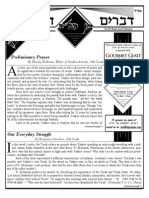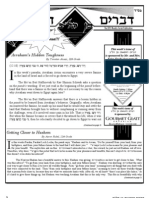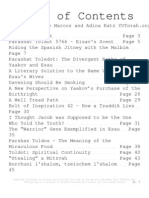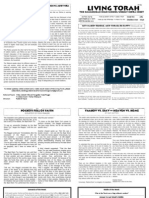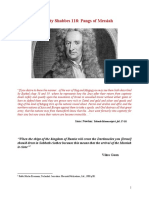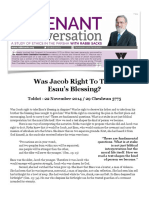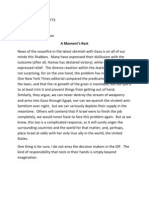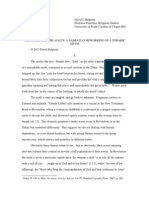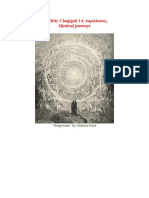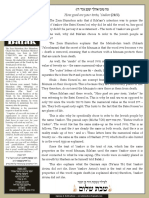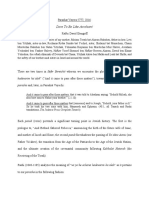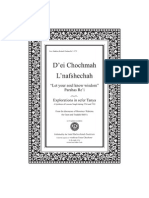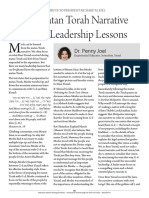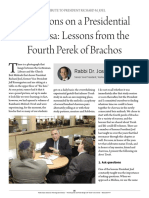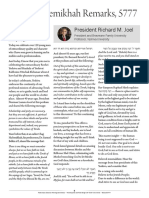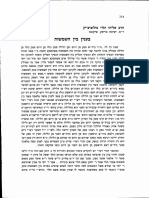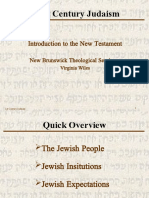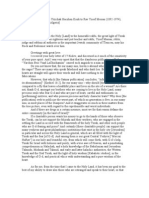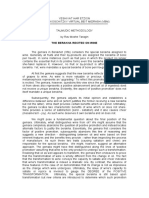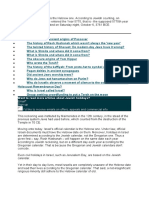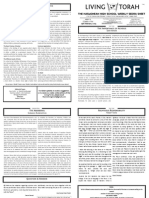The Two Hands of Esav: Jaffa Institute
The Two Hands of Esav: Jaffa Institute
Uploaded by
outdash2Copyright:
Available Formats
The Two Hands of Esav: Jaffa Institute
The Two Hands of Esav: Jaffa Institute
Uploaded by
outdash2Original Title
Copyright
Available Formats
Share this document
Did you find this document useful?
Is this content inappropriate?
Copyright:
Available Formats
The Two Hands of Esav: Jaffa Institute
The Two Hands of Esav: Jaffa Institute
Uploaded by
outdash2Copyright:
Available Formats
Dvarim Hayotzim Min Halev
~"ca
Volume XIII - Issue 5
The DRS Weekly Torah Publication
H
A
L
B
n
a
a
:
H
A
L
B
The Two Hands of Esav
By Dani Scheinman, 12th Grade
DR3\ D3"
PARSHAS VAYISHLACH
KISLEV 14, 5772
DECEMBER 10, 2011
All Zmanim are calculated by myzmanim.com for
Woodmere, NY (11598)
Candle Lighting: 4:09 pm
Latest : 9:37 am
Ends: 5:13 pm
W
e find an interesting conversation that transpired between Yaakov and Eisav. Yaakov had sent a large gift
of hundreds of animals to appease his brother, Eisav. After their initial meeting, Eisav said to Yaakov
that he appreciated the gift, however, he had plenty, and therefore did not need the gift. Yaakov re-
sponded by telling Eisav that he should take the gift, since he has all that he needs.
If one analyzes the terms that the brothers used, one would learn a tremendous lesson in the proper approach
to accepting and appreciating the gifts that one gets in this world. Eisav was a wealthy man who controlled a huge
army, and owned his own country. Yet, as wealthy as he was, he was not satisfied with what he had, and wanted
more. A story is told of a Roman Emperor who was in charge of Eretz Yisrael. He was the great-grandson of Eisav.
He had asked his servants to prepare a large banquet with every possible delicacy. When he arrived at the party, he
went to examine all the different delicacies that were there. As he walked though the aisles, he became agitated and
turned to his servant and asked why he could not find a particular nut. The servant responded that the nut was out of
season, and therefore could not be attained. At that moment, the Emperor became furious and turned over all of the
(Continued on page 5)
To sponsor an issue of
a:n n nxin n:a~.
email us at
DvarimHayotzim@gmail.com
This weeks issue and every issue of
a:n n nxin n:a~
is sponsored by
GourmetGlatt.com 516.569.2662
What Does It Mean to Be Rich?
By Elly Deutsch, 11th Grade
Rescue me, please, from the hand of my brother, the hand of Esav.
T
he Ramban, in his discussions on this Parsha, begins with an introduction
about the lessons we can learn from it. One of the concepts he mentions,
known as Maasei Avos Siman Labanim (the actions of our forefathers are
signposts for the children), seems to be a recurring theme throughout Sefer
Bereishis. Everything that occurred to our forefather Yaakov before and during
his confrontation with Esav will continually recur between Esavs descendents
and us. It is therefore fitting for us to follow the path of our righteous forefather
Yaakov. We should prepare ourselves for confrontation in the three ways he pre-
pared himself: prayer, gifts to appease Esav, and preparation for battle if neces-
sary.
The Ramban notes that the Chachamim use this Parsha as a guide in deal-
ing with Esavs descendents. He cites a Medrash that states that before Rav Yan-
nai would have dealings with the government, he would study this Parsha to pre-
pare himself. He would specificly study this Parsha because it contains the
(Continued on page 3)
10
TH
ANNUAL
COMMUNITY- WIDE BREAKFAST, FREE ADMIS-
SION
honoring
Jaffa Institute
DEDICATED TO THE CONCEPT-WHERE THERE IS
HOPE THERE IS LIFE
SUNDAY, DECEMBER 11
TH
2011
AT 9:00AM
YOUNG ISRAEL OF HILLCREST
169-07 JEWEL AVE
HILLCREST, NEW YORK
2
The Torah (32:25) tells us that the fight between
Yaakov and the mysterious man took place when Yaakov
was alone, as it states VaYevaser Yaakov Levado (and
Yaakov was left alone) VaYeiaveik ish imo ad alos
HaSchachar (and a man wrestled with him until the break
of dawn).
Chazal (Bereishis Rabbah 77:3) explain that this
man was the guardian of Eisav. Furthermore, we see that
he waiting until Yaakov was alone to fight him. Based on
this we could observe that there is a different, and special
degree a person has when he is alone, for the guardian of
Eisav went through the effort to fight Yaakov specifically
then. But what is this unique degree that Yaakov had by
being left alone?
On the passuk (Yeshaya 26:4) Ki bkah (yud hei)
Hashem Tzur Olamim (for in God, Hashem, is the
strengths of the world) Chazal explain in Gemara
Menachos (29b), that this refers to the two worlds that Ha-
shem created, one with the letter hey and one with the
letter yud this world by hey, and the World to Come
with a yud. The Gemara goes on to explain that this
world was created with a hey because it is similar to an
Achsadrah, or a type of porch, which anyone who wants
to leave can leave. Secondly, the reason why olam haba
was created with a yud is that there are very few tzadikim
that enter.
This Gemara is extremely difficult. Out of the sev-
eral, tremendous tzadikim that fill our world, only a few of
them are going to reach olam haba? Moreover, The Mish-
na in Sanhedrin (90a) says All Jews have a portion in the
World to Come! It appears from this that all the righteous
people of this world should all reach the World to Come,
yet Chazal also says in Menachos that only a few reach the
World to Come?
Rav Shimshon Dovid Pincus Tzl answers with the
following explanation: In the World to Come there are dif-
ferent levels; Some levels are higher than others. The Pas-
suk of VaYevaser Yaakov Levado is explained by Chazal
(Bereishis Rabbah 77:1) to mean that Hashem does to tza-
dikim in this world that which He plans to do with them in
the future, and just as Hashem is described (Yeshaya 2:17)
(Continued on page 5)
Torah Teasers
By Rabbi Moshe Erlbaum
Questions
1. Where do we find a question used as an answer?
(2 times)
2. a) Who asks the questions - Who are
these? b) Who else in the Torah asks -
Who are these??
3. a) Who died during childbirth? b) Where in the
did a woman die during childbirth?
4. Name two descendants of who share a name
with relatives of .
5. Name a grandson of who shares a name with
a grandson of .
6. a) Which married couple in the have names
that begin with the same letter? b) Which other
married couples in the have names that begin
with the same letter? (2 couples - one found in ")
Answers
1. After the changes the name of to ,
inquires from the to divulge his name.
The responds with a question:
- Why then do you inquire of my name?
(:). After berates and for killing
the city of , they respond
- Should he treat our sister like a harlot? (:).
2. a) When sees the family of he asks -
- Who are these? (:). b) In ,
when sees the children of , he asks the
same question - ? - Who are these?(:).
3. a) died when she gave birth to her son
(:). b) The wife of died in childbirth
when she gave birth to (: ' ).
4. and are both descendants of ( : -
). was another name of the father-in-law
of (" : ). was the cousin of
who rebelled against in the (
:).
5. was the son of the son of (:).
was also the name of a son of , the son of
(:). Thus, bothand had a grandson
named .
6. a) was married to (:). b) In
it states that was married to (
:). Although it is not explicitly stated in the ,
" comments that the wife of was , the
sister of (: ").
By Jeremy Teichman, 11th Grade
Dvarim Hayotzim Min Halev 3
And Hashem said to him, Your name is Yaakov: You shall not be called Yaakov anymore, but Yisrael shall be
your name; and He called his name Yisrael.
When Hashem told Yaakov for the first time that his name would be changed, he prefaced it by stating,
Your name is Yaakov. Why is this necessary? Surely Yaakov was aware of his own name! Secondly, when
Yaakov fought with the angel of Esav and defeated him, the angel told him, No longer will it be said that your
name is Yaakov, but rather Yisrael. Thus, it would seem that the name change had already taken place. What
was Hashem adding at this time?
The Rambam explains that that one of these questions provides the answer to the other one. Although the
angel of Esav had indeed told Yaakov that his name would be changed, the angel had not been given the mission
to actually change it. The angel was merely informing Yaakov that at some point in the future, his name would
become Yisrael. Because of this, Hashem began his message here by stating: At this point, your name is still
Yaakov, because it was not the angels right to change your name. Now, however, I will indeed call you Yisrael.
Although the Pasuk seems to say that Yaakov would no longer be called Yaakov, the commentators note
that this is not the case; we find in a later Pasuk that Hashem Himself refers to Yaakov by that name. In addition,
although we find in reference to Avraham that once his name was changed from Avram, it was forbidden to call
him Avram, with Yaakov that is not the case; The Chachamim in Masechet Berachos (13a) state that Yisrael be-
came the principal name, while Yaakov was the subsidiary name.
R Dovid Feinstein suggests that this too is hinted at in Hashems opening statement in the Pasuk, Your
name is Yaakov. I.e., Hashem is telling Yaakov: I am not renaming you as I did Avraham, so that your original
name may no longer be used. Rather, your name Yaakov is still usable; I am simply giving you another name as a
principal.
Have a good Shabbos.
chapter of exile, the source of information for proper conduct in exile.
The Beis HaLevi learns a similar lesson from the actions of Yaakov, which is relevant in all periods of Ga-
lut. Yaakov prayed to Hashem: Rescue me, please, from the hand of my brother, from the hand of Esav, for I fear
him, lest he come and strike me down, mother and children. Why, asks the Beis HaLevi, must Yaakov repeat the
word MiYad, from the hand, a second time? Yaakov could have simply said, Rescue me from the hand of my
brother Esav!
According to the Beis HaLevi, Yaakov understood that Esavs approach presented two separate dangers, and
that he needed protection from both of them. First, he saw the imminent danger of Esav waging war with him and
attempting to kill him. But Yaakov knew that even if Esav could somehow be appeased, he would still present a
danger. If Esav were to start treating Yaakov with love, this too would pose a threat, as good feelings and love from
Esav would constitute a spiritual danger to Yaakov.
Thus, Yaakov made two separate requests of Hashem: Rescue me from the hands of Esav, the wicked one
who is coming to kill me. Also rescue me from my brother from the loving, caring behavior that Esav might
(Dani Scheinman Continued from page 1)
(Continued on page 4)
The Name Game
By Yitzie Scheinman,
10th Grade
4
Everyday we say in Benching KMo Shenisbarchu Avoseinu Bakol Mikol Kol. Why do we mention three
times the word Kol? Its the same word with just an extra letter added to the beginning each time?
The story of Yaakov and Eisav in Parshas Vayishlach provides the answer. The Passuk says, VChi Yesh Li
Kol. Yaakov says to Eisav, I have it all. Rashi comments and says, Kol means I have everything I need. However,
with respect to Eisav, he says Yesh Li Rov, which means that hes not satisfied and he craves for more. From this Rashi,
we see that there is a fundamental difference between Kol and Rov. Yaakov was satisfied, while Eisav desired.
Yaakov is blessed with the Midah of satisfaction, only because of the positive influence of his father and grandfa-
ther. They too were blessed with Kol, and it was expressed in different ways.
The first time the word Kol is in connection with Avraham. There it says, VHashem Berach Es Avraham
BKol, Hashem blessed Avraham with all. Rashi says that the word BKol52 is equal numerically to the word Ben
son, meaning that Avrahams blessing was Yitzchak. The Seforno adds and says that Avraham was worried about
Yitzchak. One, that due to his old age, he wont be able to see Yitzchak get married, and also, he was afraid the girl wont
be the right one for Yitzchak. The Gemara in Baba Basra explains that BKol is to include that during Avrahams life,
he didnt see his descendants as sinners, and he lived a complete life (Yishmael did Teshuvah, and Eisav was too young to
act improperly).
Yitzchak too said the word Kol. After Yaakov received the Brachos, he told Eisav, VAchal Mikol, I ate from
all. The Medrash Rabbah says regarding this phrase that Yitzchak ate from fruits that were from the Six Days of Crea-
tion.
With this background, we can answer our question with respect to benching. When the Torah says Kol in connec-
tion with Avraham and Yitzchak, they were explained in terms of spirituality. By Avraham, his Kol is having a complete
family, and a complete life. By Yitzchak Kol means that he tastes something not from this world Meein Olam Habah.
The word Kol by Yaakov can also mean something spiritual. This understanding teaches us an important lesson: The only
time a person can be satisfied, like Yaakov, is if its spiritual, like family and personal life, which are spiritual blessings.
However, if someone focuses on the worldly and secular accepts of life, he will be an Eisav, a person who has Rov, and
will never be content. This also explains why we say Bakol Mikol Kol. These three words represent the way the Avos
looked at satisfaction (Avraham was Bakol, Yitzchak was Mikol, and Yaakov was Kol). This is what we daven to Ha-
shem for, that we too should learn the same Midah of satisfaction like the Avos. May it be that we should learn and un-
derstand what the true meaning of Kol is, just as the Avos did, and grow from this understanding.
Have a wonderful Shabbos!
Having It
All
By Moishy Rothman,
10th Grade
adopt.
The Beis HaLevi concludes by noting how these two hands of Esav have continually appeared throughout
our lengthy exile. First, nations would issue harsh decrees on the Jews, and inflict pain and death on them. Then,
Hashem has mercy and saves us from their wicked hands. Later, the nations try to befriend us and give us equal
rights, offering to travel together with us as Esav himself did. We must realize that these gestures of friendship
are all too often only a ploy, meant to detach us from our strong commitment to the Torah. We must constantly re-
member that both of these hands pose equal danger to the continued existence of the Jew.
Have a wonderful Shabbos!
(Dani Scheinman Continued from page 3)
Dvarim Hayotzim Min Halev 5
tables of food. The Emperor had every possible deli-
cacy know to man, except for one nut, and that gave
him no pleasure in life. He was not satisfied with
what he had, and always needed more.
Yaakov on the other hand, responded to his
brother that he had everything. This implies that he
was completely satisfied and did not need more. As
we find from a Mishnah in Avos (4:1), Aizehu Ashir,
Hasomeiach Bichelko, He who is rich, is happy
with what he has. The Sfas Emes explains that true
wealth is attained by the individual who recognizes
that Hashem has allocated him his proper portion.
Such an attitude is based upon the unshakable belief
that Hashem compensates every individual with all
his needs. We know the famous concept, of Maaseh
Avos, Siman Lbanim, The actions of the forefa-
thers are lessons for future generations. Yaakov was
teaching us that one should always be satisfied with
what he has received in this world, and recognize that
he needs no more. Yaakov knew that if he needed
more, Hashem would have given it to him.
Just like Eisavs grandson learned from his
grandfather to never be satisfied, we too must inter-
nalize the teaching of Yaakov; we should be satisfied
with our portion of material wealth in this world. On-
ly in the area of Ruchnius, should a person not be sat-
isfied, rather he should strive for greater heights. A
similar idea is expressed in last weeks parsha: Yaa-
kov was dreaming about a ladder going to Shamayim.
This dream symbolized Yaakovs desire to grow spir-
itually. He was lying on the ground and he was look-
ing for ways to climb the ladder to become closer to
Hashem.
Have a great Shabbos!
(Elly Deutsch Continued from page 1)
other visitors from Franz Joseph's government. And when
they reached the "forbidden room," the Emperor asked to
go inside and see what was there.
Anshel explained that that was the one place he
could not show anyone. After the Emperor insisted, Anshel
gave in, and agreed to show the Emperor the secret room.
He took out his keys, opened the door, and invited the Em-
peror to enter. Franz Joseph looked, and was amazed at
what he saw. There, in a small room, was a simple pine
box, and some plain white cloth on a table. That was all
there was!
"What is this all about?" asked the Emperor.
"We Jews have strict rules about burial customs,"
explained Anshel. "When a person dies, he must be buried
in a very simple coffin, a plain pine box. And his body
must be enveloped in a plain white shroud. This is to main-
tain the equality of all G-d's creatures. No one is permitted
to be buried in a fancy, expensive coffin, or in luxurious
clothing. Though some may live affluent lives, and others
may suffer dire, abject poverty, in death all are equal."
"But why is this here in this room?" asked the Em-
peror, impressed but still confused.
"At the end of each day, I come to this room, and
view the coffin and the shrouds, and I am reminded that
even though I have great wealth and power and I have im-
portant influence in the highest echelons of the Austrian
Empire, I am still one of G-d's simple creatures, and at the
end of my life, this is the end I will come to like all of G-
d's other children. I do this lest after a day filled with high
finance and major financial transactions, I think too highly
of myself, and develop a bloated sense of myself."
Franz Joseph was amazed, and in fact, he was
speechless. His respect for Anshel Rothschild grew even
greater than before. He never questioned the sincerity, hon-
esty or integrity of Anshel again.
(Stories of Greatness Continued from page 8)
as Vnisgav Hashem levado (Hashem alone will be exalted), so too Yaakov is described as Vayevaser Yaakov
levado.
One of the 13 Ikarei Emunah written by the Rambam is the belief that Hashem is the First and the Last.
Meaning, before there was literally anything in existence, Hashem existed alone. Then Hashem created the world
for the sake of His Name and for the purpose of having reward and punishment and earning Olam Haba, which
each member of Klal Yisrael has a portion to. However, when the day comes that Hashem will be Vnisgav Ha-
shem levado byom hahu, on that day that Hashem will be praised alone, was what Chazal referred to when dis-
cussing the World created with yud, and Byom hahu on that day, only the most unique and special few will
be remaining. On that day that Hashem is exalted alone, as described by Yeshaya, only the most exclusive of tza-
dikim, who also have the exceptional characteristic of Vayevaser levado will merit to reach it.
Have an amazing Shabbos!
(Jeremy Teichman Continued from page 2)
6
HALACHA
Corner
I. Introduction. At a typical Shabbat morning kiddush in most shuls,
the large majority of people make kiddush on a shot glass of
scotch or whiskey, rather than on the traditional full size cup
of wine. Often, those who sponsor a kiddush provide only a
minimal amount of wine, while hard drinks are plentiful.
While this trend has had significant sociological implications
(teenagers learning to drink at an unsupervised shul kiddush,
adults missing major segments of davening in order to get
together with their friends to drink a few shots at a kiddush
club, etc.), we will focus this essay on the halachic consider-
ations of making kiddush on beverages other than wine. Our
discussion will center specifically on the halachot of making
kiddush on chamar medina, or drinks other than wine that are
commonly used in a particular place.
II. Using Scotch and Whiskey. The Shulchan Aruch (Orach Chaim
272:9 and 289:2) rules that in the absence of wine one may
recite kiddush over beer. The Mishnah Berurah (ibid. 272:24)
explains that this is only true in a place where beer is com-
monly drunk and may therefore be considered to be chamar
medina. Similarly, other commonly drunk beverages that fall
into the category of chamar medina may be used for kiddush
in the absence of wine.
A. Defining chamar medina. It is important to note that not
every drink that people commonly consume has the status
of chamar medina. Only beverages that are halachically
considered chamar medina may be used for the mitzvah of
kiddush. The later poskim differ as to the exact definition
of the term chamar medina. This difference of opinion has
obvious implications on which drinks may be used for
kiddush.
1. The opinion of the Shulchan Aruch Harav. The Shul-
chan Aruch Harav (182:2-3) rules that there are two
criteria that must be met for a beverage to attain the
status of chamar medina. First, the drink must be one
that people use as a primary beverage for a meal,
much the way it was common to drink wine with
most meals in ancient times. Second, the beverage
must not be cheap and trivial, but should have some
significance. Therefore, although borscht was com-
monly drunk with meals, due to its low stature, it
would not be considered chamar medina.
2. The opinion of Rav Moshe Feinstein. Rav Moshe
Feinstein (Responsa Iggerot Moshe, Orach Chaim II
#75) defines chamar medina as a beverage one might
serve to a guest to whom one wishes to show respect
(and not merely for the purpose of quenching his
thirst).
3. Practical halacha of liquor as chamar medina. It
would seem that regardless of which definition of
chamar medina we choose, beer and liquor (whiskey,
brandy etc.) are both considered chamar medina.
Indeed, the Shulchan Aruch (289:2) rules clearly that
beer may be used for kiddush, and the Mishnah Beru-
rah (272:30) rules that liquor is considered chamar
medina. (See also Responsa Minchat Yitzchak X
#22.)
B. When may chamar medina be used? Although there are
occasions when one may use drinks other than wine for
kiddush, such circumstances are rather limited.
1. Nighttime. The Shulchan Aruch (272:9) cites the
opinion of the Rosh that even if one does not have
any wine he should not recite the Friday night kid-
dush on another beverage. Rather, he should recite
the kiddush over the challah, as it is considered to be
a more prestigious food than chamar medina.
2. Daytime. The Shulchan Aruch (ibid.) rules that for the
daytime kiddush, if one does not have any wine, he
should use chamar medina rather than make kiddush
on the challah, even though challah is generally con-
sidered to be superior to chamar medina. The logic
for this ruling is based on a fundamental distinction
between the night time kiddush and the day time kid-
dush. The nighttime kiddush has a specific text
whereas the day time kiddush consists exclusively of
the beracha that is recited on the wine. When one
makes kiddush on challah at night, it is still apparent
that he is reciting kiddush, and not just making his
regular hamotzi, because he recites the entire text of
kiddush. When, however, one recites the daytime
kiddush over challah, he merely recites the beracha
of hamotzi, which is a beracha he would recite on the
bread even if he were not making kiddush. In order,
that it be apparent that the person is reciting kiddush
at the day time meal, it is important that he make a
beracha that he would otherwise not recite. (Mihnah
Berurah 272:31)
a. The stringent view. Based on the above-cited
sources it would seem abundantly clear that one
may never make kiddush on liquor on Friday
night, and may only make kiddush on liquor on
Shabbat day when there is no wine available to
him. The Mishnah Berurah (ibid.:29) recom-
mends that where wine is available, one should
only use wine for kiddush.
b. The lenient view. The Mishnah Berurah (ibid.)
records that many great people had the custom to
recite the daytime kiddush over other beverages
even when wine was available. They were lenient
based on a combination of two considerations.
First, wine was extremely expensive, and had
fallen out of common use in favor of other drinks.
Second, they felt that one may be lenient for the
daytime kiddush because the obligation to recite
kiddush during the day is only Rabbinic in nature.
Rabbi Shmuel Wosner (Responsa Shevet Halevi
III #26) suggests an additional reason to allow
other beverages even where wine is available. He
explains that in Talmudic times people drank
wine very regularly. In some towns wine was so
popular that people barely drank any water (see
Tosafot Shabbat 47a). When wine had such wide-
(Continued on page 7)
Making Kiddush on Beverages Other Than Wine
By Rabbi Aryeh Lebowitz
Dvarim Hayotzim Min Halev 7
spread popularity we can certainly understand the
obligation to attain wine for kiddush rather than
settling for liquor or beer. Today, however, most
people, especially in the Orthodox Jewish com-
munity, do not drink wine regularly. Therefore,
other beverages are no longer considered inferior
to wine for the purposes of the mitzvah of kid-
dush. (See also Responsa Shevet Halevi V #32
where he reaffirms this position.)
C. How much must be drunk?
1. When using wine. The Shulchan Aruch (271:13) rules
that one must recite kiddush over a cup that contains
a reviit of wine, and he must actually drink the ma-
jority of a reviit. The Talmud (Pesachim 109) gives
two methods of measuring a reviit that practically do
not yield the same results. There is considerable dis-
cussion amongst the acharonim regarding the resolu-
tion to this problem. A thorough presentation of this
discussion is well beyond the scope of this essay (see
Tzlach to Pesachim 116, Mishnah Berurah 486:1,
Aruch Hashulchan 472:12, and Chazon Ish 39). Suf-
fice it to say, the leading contemporary poskim debate
the exact measurement of a reviit. The possibilities
range from 3.07 fluid ounces (Rav Chaim Naeh) to
5.36 fluid ounces (Chazon Ish). Rav Moshe Feinstein
ruled that for the purposes of the morning kiddush a
reviit is 3.3 ounces. Therefore, one must make kid-
dush on a cup that contains at least 3.3 ounces and
one must actually drink 1.7 ounces of wine (most of a
reviit).
2. When using whiskey etc. Drinking the proper measure
of wine does not present any particular difficulty.
After all, it is common to drink a sizable glass of
wine. Drinking the proper measure of whiskey, how-
ever, can present a problem for many people. The
average shot glass can only hold one fluid ounce.
Many people have the practice to make kiddush even
on this minimal amount of liquor. We will attempt to
analyze whether there is any sound halachic basis for
this practice.
a. The stringent view. The Mishnah Berurah
(272:30) clearly rules that the measure of a re-
viit is required regardless of the beverage one
uses for kiddush. Most leading poskim concur
with this view and therefore rule that one may
not fulfill his obligation of kiddush on Shabbat
morning with a one or two ounce shot glass of
whiskey.
b. The lenient view.
i. The opinion of the Taz. The Taz (Orach
Chaim 210:1) writes that although normally
one must drink a reviit of any drink in order
to be required to recite a beracha acharona,
one need not drink a reviit of liquor to require
a beracha acharona. The logic for this conten-
tion is that while one is not considered to have
drunk a significant amount of a beverage until
he has had a reviit, a much lesser amount of
liquor is already deemed significant. In fact,
most people usually drink less than a reviit of
liquor. Rav Tzvi Pesach Frank (Responsa Har
Tzvi I #159) extends this leniency of the Taz
to kiddush and states that according to the Taz
one may recite kiddush on less than a reviit of
liquor. While some poskim support the opin-
ion of the Taz (see Responsa Chatam Sofer
49), the Magen Avraham (Orach Chaim 190)
rejects the opinion of the Taz, and states that
Chazal established measurements for all liq-
uids and did not distinguish between liquids
that people commonly drink different quanti-
ties of. The Mishnah Berurah (190:14;
272:30) rules in accordance with the opinion
of the Magen Avraham.
ii. The opinion of the Kozhoglover Gaon. Rabbi
Hershel Schachter (Bikvei Hatzon page 41)
cites the author of Responsa Eretz Tzvi who
had a very unique approach to allow kiddush
on less than a reviit of liquor. He argues that
the measure of a reviit only applies to bever-
ages, and liquor does not have the status of a
beverage. The definition of a beverage is
something that people would drink to quench
their thirst. Any liquid that people drink for
other reasons (i.e. soup, liquor) have the status
of a food. The measurement of a food that
would require a beracha acharonah and be
considered a significant consumption is a
kzayit (the size of an olive-much less than a
reviit). While a small shot glass definitely
does not contain a reviit, it may contain a
kzayit. This argument, however, seems to be
flawed. Rav Chaim MVolozhin (also cited in
Bikvei Hatzon ibid. from Sefer Shaar Ra-
chamim) used the same logic that liquor is
actually a food, to prove that one may not
make kiddush on liquor at all. After all, the
most basic criteria of chamar medina is that it
be a beverage, not a food.
III. Conclusion. We have outlined the basic problems with reciting
kiddush on liquor and have surveyed the solutions and counterat-
tacks of the leading poskim. First, many poskim maintain that one
may not make kiddush on liquor at all unless there is no wine
available to him. Others are lenient even when wine is available.
Second, even if one uses liquor, most poskim maintain that one
must drink a reviit (or most of a reviit) of the liquor. While
some poskim posed arguments to be lenient in the amount of liq-
uor one is required to drink, their arguments were met with sig-
nificant criticism. Nevertheless, Responsa Maharsham (I #175)
records that many great rabbis were lenient in this area. In sum-
mation, at the nighttime kiddush all authorities agree that only
wine should be used. For the daytime kiddush, ideally one should
refrain from using liquor. Certainly, one who uses liquor should
be careful to use a cup that contains a full reviit, unless he has a
specific tradition to the contrary.
Have a good Shabbos.
(Continued from page 6)
HALACHA
Corner
Contnued
8
The DRS Yeshiva High School For Boys
700 Ibsen Street, Woodmere, NY 11598
Phone: (516) 295-7700 - Fax: (516) 295-4790
a:n n nxin n:a~
Weekly Torah Publication of the DRS Yeshiva High School
STORIES OF GREATNESS
TOLD OVER BY: MARC EICHENBAUM
PUBLICATION
STAFF
Editors in Chief
Avrumi Blisko
Dani Scheinman
Associate Editors
Yitzie Scheinman
Benjamin Watman
layout editors
Shmuli Gutenmacher
rabbinic articles
Yonatan Mehlman
student articles
Production Staff
Andrew Mermelstein
director of production
Josh Wein
Nisan Basalilov
Jeremy Beninfeld
production staff
/Authors
Benny Aivazi
Yonatan Aivazi
David Beer
Yoshi Block
Elly Deutsch
Yehuda Fogel
Max Fruchter
Andrew Goldstein
Ari Gutenmacher
Eli Guttman
Aryeh Helfgot
Yehuda Inslicht
Aaron Joseph
Yoni Kadish
David Lauer
Eli Lonner
Moshe Lonner
Zev Miller
Yosef Naiman
Gavi Nelson
Jonathan Perlman
Avi Porter
Shmulie Reichman
Moishy Rothman
Aaron Rubel
Ariel Sacknovitz
Yigal Saperstien
Avrumi Schonbrun
Yoel Schreier
Alex Selesny
Donny Steinberg
Jesse Steinmetz
Chili Szlafrok
Jeremy Teichman
David Weitzman
Matanya Yehonatan
Maggid of DRS
Marc Eichenbaum
Menahel
Rabbi Y. Kaminetsky
Faculty Advisors
Rabbi E. Brazil
Rabbi M. Erlbaum
Rabbi A. Lebowitz
The following fascinating story, is called
Anschel Rothchild's Secret Room. Taken
from www.Chabad.org:
Everyone has heard of the famous,
wealthy banking family, the Rothschilds. The
"founding father" of the Rothschild clan was
Anshel Rothschild, an Orthodox Jew who
lived in the middle of the nineteenth century
in Austria. Anshel amassed a huge fortune
and established a close relationship with the
then Emperor of Austria, Franz Joseph.
From time to time, the Emperor would
send visitors to the luxurious and famous pal-
ace of Anshel Rothschild. It was the most lav-
ish, luxurious and well-appointed palace in all
of Austria, and everyone wanted to see its
beauty and wealth.
During one visit Anshel took his
guest, an important government official, on a
tour of the palace. He showed him room after
room, and the guest was awed by the beauty
of the gold, the silver, the furnishings, the
chandeliers, the imported fabrics. Everything
was a sight to behold. There existed nothing
like it in all of Austria. When Anshel passed a
certain door, he continued walking, but the
guest asked to be shown the room behind the
door.
"I am sorry," said Anshel. "This is the
one room in the palace that I cannot show
you."
"Why not?" asked the guest. "I would
love to see every part of your remarkable pal-
ace.
"I simply cannot," answered Anshel,
and continued walking. The tour concluded,
and the official returned to his master, and
reported everything he saw. The palace was
even more than one could imagine.
"However," said the official to the Emperor,
"there was one room that Anshel refused to
show me."
"Why not?" asked the Emperor.
"I do not know. But I can guess. You
know how wealthy those Jews are. My theory
is that in that room there is a magic money-
making machine. That is why he is so
wealthy. Behind that door must be a machine
that creates the wealth of Anshel Rothschild."
The Emperor did not know whether to
believe his official, so he sent a second gov-
ernment official to see the palace of Anshel
Rothschild. The second official came back
with the same story. And a third, and a fourth.
The curiosity of Emperor Franz Jo-
seph was greatly aroused, so he decided to go
himself and visit the palace. Anshel took the
Emperor for the same tour as he did all the
(Continued on page 5)
You might also like
- Secrets of The Prayer ShawlDocument55 pagesSecrets of The Prayer ShawlProf.M.M.Ninan94% (18)
- Lessons Learned From Conversion: Rabbi Zvi RommDocument5 pagesLessons Learned From Conversion: Rabbi Zvi Rommoutdash2No ratings yet
- Headlines: Halachic Debates of Current EventsDocument18 pagesHeadlines: Halachic Debates of Current EventsChabad Info EnglishNo ratings yet
- Elevating The Mundane: by Yehuda Fogel, 12th GradeDocument10 pagesElevating The Mundane: by Yehuda Fogel, 12th Gradeoutdash2No ratings yet
- Preliminary Prayer: by Moishy Rothman, Editor of Student Articles, 12th GradeDocument10 pagesPreliminary Prayer: by Moishy Rothman, Editor of Student Articles, 12th Gradeoutdash2No ratings yet
- Different Backgrounds: Did Yaakov Really Lie?Document6 pagesDifferent Backgrounds: Did Yaakov Really Lie?outdash2No ratings yet
- Tzadik in Business: Jaffa InstituteDocument10 pagesTzadik in Business: Jaffa Instituteoutdash2No ratings yet
- VayishlachDocument2 pagesVayishlachLivingTorahNo ratings yet
- UntitledDocument8 pagesUntitledoutdash2No ratings yet
- Mi'veid Mixac: Actions Speak Louder Than WordsDocument8 pagesMi'veid Mixac: Actions Speak Louder Than Wordsoutdash2No ratings yet
- Taking The First Step: Volume XIII - Issue 13 The DRS Weekly Torah PublicationDocument8 pagesTaking The First Step: Volume XIII - Issue 13 The DRS Weekly Torah Publicationoutdash2No ratings yet
- UntitledDocument10 pagesUntitledoutdash2No ratings yet
- Mutual Respect: by Ariel Sacknovitz, Director of Production, 12th GradeDocument8 pagesMutual Respect: by Ariel Sacknovitz, Director of Production, 12th Gradeoutdash2No ratings yet
- Looking To Improve: The Staff ofDocument8 pagesLooking To Improve: The Staff ofoutdash2No ratings yet
- UntitledDocument71 pagesUntitledoutdash2No ratings yet
- Mi'Mizrach Shemesh For BechukotaiDocument4 pagesMi'Mizrach Shemesh For BechukotaiMatthew CobbNo ratings yet
- Likutei Ohr: A Publication ofDocument2 pagesLikutei Ohr: A Publication ofoutdash2No ratings yet
- The Eulogy For Yoshiyahu Hamelech: Insights Into Kinah 11Document7 pagesThe Eulogy For Yoshiyahu Hamelech: Insights Into Kinah 11outdash2No ratings yet
- Mi'veid Mixac: Shabbos and Achdus: 2 Peas in A PodDocument8 pagesMi'veid Mixac: Shabbos and Achdus: 2 Peas in A Podoutdash2No ratings yet
- Who's Crying?: Parashat Nitzavim Elul 28 5775 September 12, 2015 Vol. 25 No. 1Document4 pagesWho's Crying?: Parashat Nitzavim Elul 28 5775 September 12, 2015 Vol. 25 No. 1outdash2No ratings yet
- An Enlightening Source: Shem: A Model of An Appreciative SonDocument8 pagesAn Enlightening Source: Shem: A Model of An Appreciative Sonoutdash2No ratings yet
- Vayigash 56Document21 pagesVayigash 56CarudijanNo ratings yet
- UntitledDocument8 pagesUntitledoutdash2No ratings yet
- The Wicked Gatherer: Volume XIV - Issue 23 The DRS Weekly Torah PublicationDocument12 pagesThe Wicked Gatherer: Volume XIV - Issue 23 The DRS Weekly Torah Publicationoutdash2No ratings yet
- Kol HaNe'arim Special Pesach Edition!Document12 pagesKol HaNe'arim Special Pesach Edition!Ari Bar-ShainNo ratings yet
- The "Qal Va - Omer" Argument in The Old TestamentDocument8 pagesThe "Qal Va - Omer" Argument in The Old TestamentEric_CrowNo ratings yet
- Our Potential: Greater Than The Angels: Hazeh" ("It Came To Pass in That Very Day")Document4 pagesOur Potential: Greater Than The Angels: Hazeh" ("It Came To Pass in That Very Day")outdash2No ratings yet
- Shemos 5784Document10 pagesShemos 5784W ALBARELLONo ratings yet
- ToldosDocument2 pagesToldosLivingTorahNo ratings yet
- DR York - Are The Caucasians EdomitesDocument161 pagesDR York - Are The Caucasians EdomitesNWPU100% (2)
- Material and SpiritualDocument11 pagesMaterial and SpiritualHarav Michael ElkohenNo ratings yet
- Toronto Toronto Torah TorahDocument4 pagesToronto Toronto Torah Torahoutdash2No ratings yet
- Living in Two WorldsDocument11 pagesLiving in Two WorldsHarav Michael Elkohen100% (3)
- Rav Baruch Rosenblum - Lech Lecha 5779 - 5783Document6 pagesRav Baruch Rosenblum - Lech Lecha 5779 - 5783danielporpinoNo ratings yet
- Shabbat 118Document23 pagesShabbat 118Julian Ungar-SargonNo ratings yet
- Ploni Almoni: by Avrumi Blisko, 12th Grade, Editor-in-ChiefDocument8 pagesPloni Almoni: by Avrumi Blisko, 12th Grade, Editor-in-Chiefoutdash2No ratings yet
- Rashi On Hosea - en - The Judaica Press Complete Tanach With Rashi, Translated by A. J. Rosenberg - PlainDocument33 pagesRashi On Hosea - en - The Judaica Press Complete Tanach With Rashi, Translated by A. J. Rosenberg - Plainnestorsouza36No ratings yet
- MeorosDocument115 pagesMeorosJon BentonNo ratings yet
- Jacob Tuvo Derecho de Usurpar La Bendición de Esaú - Propuesta de 2 HistoriasDocument4 pagesJacob Tuvo Derecho de Usurpar La Bendición de Esaú - Propuesta de 2 HistoriasYailyn D. ColonNo ratings yet
- 1.8 Spanish Vaishlaj 5778Document4 pages1.8 Spanish Vaishlaj 5778e-jajamNo ratings yet
- Toronto TorahDocument4 pagesToronto Torahoutdash2No ratings yet
- Being Wise of Heart: Volume XIII - Issue 11 The DRS Weekly Torah PublicationDocument8 pagesBeing Wise of Heart: Volume XIII - Issue 11 The DRS Weekly Torah Publicationoutdash2No ratings yet
- Parshat Vayetzei - 5773Document6 pagesParshat Vayetzei - 5773SkokieShulNo ratings yet
- "After Death" - "You Shall Be Holy": by Josh Kaufman, 12th GradeDocument8 pages"After Death" - "You Shall Be Holy": by Josh Kaufman, 12th Gradeoutdash2No ratings yet
- Snake and KabbalahDocument10 pagesSnake and KabbalahJulian Ungar-SargonNo ratings yet
- Swearing in G-D'S Name Etuu - ' - V (Txä Gtâuxá: VayeitzeiDocument4 pagesSwearing in G-D'S Name Etuu - ' - V (Txä Gtâuxá: Vayeitzeioutdash2No ratings yet
- Your Go To Haggada - 2011 - Final VersionDocument51 pagesYour Go To Haggada - 2011 - Final VersionMarc GelbtuchNo ratings yet
- Chagigah 14Document92 pagesChagigah 14Julian Ungar-SargonNo ratings yet
- Parshas Ki Teitzei-EnglishDocument28 pagesParshas Ki Teitzei-EnglishHarav Michael ElkohenNo ratings yet
- Jesus Mary and Akiva Ben Joseph Reading PDFDocument41 pagesJesus Mary and Akiva Ben Joseph Reading PDFBenjámin MontskóNo ratings yet
- Jacob or Israel?Document4 pagesJacob or Israel?outdash2No ratings yet
- Switching Sisters - Matos 2011Document5 pagesSwitching Sisters - Matos 2011eshoff9155No ratings yet
- Correos Electrónicos Zera-Shimshon-Balak-1Document1 pageCorreos Electrónicos Zera-Shimshon-Balak-1Deborah Juailler AragonNo ratings yet
- Haftorah - Reuben EbrahimoffDocument95 pagesHaftorah - Reuben Ebrahimoffapi-3811809100% (1)
- Dare To Be Like Avraham!Document4 pagesDare To Be Like Avraham!outdash2No ratings yet
- Parshas Re'i EnglishDocument26 pagesParshas Re'i EnglishHarav Michael Elkohen100% (1)
- Parshat Bo: Created byDocument1 pageParshat Bo: Created byoutdash2No ratings yet
- The Redemption Process Has Begun: Rabbi Dov Moshe LipmanDocument5 pagesThe Redemption Process Has Begun: Rabbi Dov Moshe Lipmanoutdash2No ratings yet
- Parashas Beha'aloscha: 16 Sivan 5777Document4 pagesParashas Beha'aloscha: 16 Sivan 5777outdash2No ratings yet
- UntitledDocument12 pagesUntitledoutdash2No ratings yet
- Chavrusa: Chag Hasemikhah ז"עשתDocument28 pagesChavrusa: Chag Hasemikhah ז"עשתoutdash2No ratings yet
- The Matan Torah Narrative and Its Leadership Lessons: Dr. Penny JoelDocument2 pagesThe Matan Torah Narrative and Its Leadership Lessons: Dr. Penny Joeloutdash2No ratings yet
- UntitledDocument12 pagesUntitledoutdash2No ratings yet
- 879510Document14 pages879510outdash2No ratings yet
- The Power of Obligation: Joshua BlauDocument3 pagesThe Power of Obligation: Joshua Blauoutdash2No ratings yet
- The Meaning of The Menorah: Complete Tanach)Document4 pagesThe Meaning of The Menorah: Complete Tanach)outdash2No ratings yet
- Flowers and Trees in Shul On Shavuot: Rabbi Ezra SchwartzDocument2 pagesFlowers and Trees in Shul On Shavuot: Rabbi Ezra Schwartzoutdash2No ratings yet
- The Surrogate Challenge: Rabbi Eli BelizonDocument3 pagesThe Surrogate Challenge: Rabbi Eli Belizonoutdash2No ratings yet
- I Just Want To Drink My Tea: Mrs. Leah NagarpowersDocument2 pagesI Just Want To Drink My Tea: Mrs. Leah Nagarpowersoutdash2No ratings yet
- Shavuot To-Go - 5777 Mrs Schechter - Qq4422a83lDocument2 pagesShavuot To-Go - 5777 Mrs Schechter - Qq4422a83loutdash2No ratings yet
- Consent and Coercion at Sinai: Rabbi Dr. Jacob J. SchacterDocument3 pagesConsent and Coercion at Sinai: Rabbi Dr. Jacob J. Schacteroutdash2No ratings yet
- Lessons From Mount Sinai:: The Interplay Between Halacha and Humanity in The Gerus ProcessDocument3 pagesLessons From Mount Sinai:: The Interplay Between Halacha and Humanity in The Gerus Processoutdash2No ratings yet
- Kabbalat Hatorah:A Tribute To President Richard & Dr. Esther JoelDocument2 pagesKabbalat Hatorah:A Tribute To President Richard & Dr. Esther Joeloutdash2No ratings yet
- Torah To-Go: President Richard M. JoelDocument52 pagesTorah To-Go: President Richard M. Joeloutdash2No ratings yet
- Performance of Mitzvos by Conversion Candidates: Rabbi Michoel ZylbermanDocument6 pagesPerformance of Mitzvos by Conversion Candidates: Rabbi Michoel Zylbermanoutdash2No ratings yet
- What Happens in Heaven... Stays in Heaven: Rabbi Dr. Avery JoelDocument3 pagesWhat Happens in Heaven... Stays in Heaven: Rabbi Dr. Avery Joeloutdash2No ratings yet
- Reflections On A Presidential Chavrusa: Lessons From The Fourth Perek of BrachosDocument3 pagesReflections On A Presidential Chavrusa: Lessons From The Fourth Perek of Brachosoutdash2No ratings yet
- A Blessed Life: Rabbi Yehoshua FassDocument3 pagesA Blessed Life: Rabbi Yehoshua Fassoutdash2No ratings yet
- Experiencing The Silence of Sinai: Rabbi Menachem PennerDocument3 pagesExperiencing The Silence of Sinai: Rabbi Menachem Penneroutdash2No ratings yet
- Chag Hasemikhah Remarks, 5777: President Richard M. JoelDocument2 pagesChag Hasemikhah Remarks, 5777: President Richard M. Joeloutdash2No ratings yet
- 879446Document5 pages879446outdash2No ratings yet
- Why Israel Matters: Ramban and The Uniqueness of The Land of IsraelDocument5 pagesWhy Israel Matters: Ramban and The Uniqueness of The Land of Israeloutdash2No ratings yet
- Yom Hamyeuchas: Rabbi Dr. Hillel DavisDocument1 pageYom Hamyeuchas: Rabbi Dr. Hillel Davisoutdash2No ratings yet
- Nasso: To Receive Via Email VisitDocument1 pageNasso: To Receive Via Email Visitoutdash2No ratings yet
- José Faur: Modern Judaism, Vol. 12, No. 1. (Feb., 1992), Pp. 23-37Document16 pagesJosé Faur: Modern Judaism, Vol. 12, No. 1. (Feb., 1992), Pp. 23-37outdash2No ratings yet
- Appreciating Moses' GreatnessDocument4 pagesAppreciating Moses' Greatnessoutdash2No ratings yet
- Chavrusa: Chag Hasemikhah ז"עשתDocument28 pagesChavrusa: Chag Hasemikhah ז"עשתoutdash2No ratings yet
- First Century Judaism: Introduction To The New TestamentDocument35 pagesFirst Century Judaism: Introduction To The New Testamentvirginiawiles100% (1)
- New Volume of Igros MosheDocument5 pagesNew Volume of Igros MoshechaimwiederNo ratings yet
- Letter From Rav Kook To Rav MessasDocument3 pagesLetter From Rav Kook To Rav MessasksavyadkodeshNo ratings yet
- The Berakha Recited On WineDocument3 pagesThe Berakha Recited On WineFidel MorenoNo ratings yet
- The Word "Torah" in The TorahDocument5 pagesThe Word "Torah" in The TorahJurgen EstoNo ratings yet
- New Milford Public Schools 2021 - 2022 School Calendar: October November SeptemberDocument1 pageNew Milford Public Schools 2021 - 2022 School Calendar: October November SeptemberRobert OramNo ratings yet
- 582 Reciting Tehillim IDocument2 pages582 Reciting Tehillim INora T.No ratings yet
- High Holiday Services 2017 PDFDocument3 pagesHigh Holiday Services 2017 PDFapi-234669542No ratings yet
- V'Samachta B'Chagecha:: and You Will Be Happy On Your HolidayDocument5 pagesV'Samachta B'Chagecha:: and You Will Be Happy On Your Holidayoutdash2No ratings yet
- Zadok Way Calendar 2022-2023Document12 pagesZadok Way Calendar 2022-2023matalabNo ratings yet
- Megillah 25Document94 pagesMegillah 25Julian Ungar-SargonNo ratings yet
- Toronto TorahDocument4 pagesToronto Torahoutdash2No ratings yet
- Rabbi Josh Yuter - Reviewing Rabbinic Oversight A Response To Rabbi Jeffrey FoxDocument23 pagesRabbi Josh Yuter - Reviewing Rabbinic Oversight A Response To Rabbi Jeffrey FoxRabbi Joshua Yuter100% (1)
- Behaalotekha ETZ HAYIMDocument26 pagesBehaalotekha ETZ HAYIMUriel Moreno MartinezNo ratings yet
- Related Articles: Want To Read More Articles About Jewish Holidays?Document5 pagesRelated Articles: Want To Read More Articles About Jewish Holidays?shibly anastasNo ratings yet
- Our Sukkah Guests: UshpizinDocument6 pagesOur Sukkah Guests: Ushpizinoutdash2No ratings yet
- The Significance of The 3Document7 pagesThe Significance of The 3hjvNo ratings yet
- Judaism: Abrahamic ReligionsDocument6 pagesJudaism: Abrahamic ReligionsThirdy Macaranas50% (2)
- Basar Vchalav Shiur 4Document11 pagesBasar Vchalav Shiur 4jose contrerasNo ratings yet
- Siman 4 Seif 8-13Document1 pageSiman 4 Seif 8-13Василий ТкачевNo ratings yet
- Ki SisaDocument2 pagesKi SisaLivingTorahNo ratings yet
- רשימת שדכנים באירופהDocument2 pagesרשימת שדכנים באירופהshilatch052No ratings yet
- Kiddush B'Makom Seudah: For Technical Information Regarding Use of This Document, Press CTRL andDocument11 pagesKiddush B'Makom Seudah: For Technical Information Regarding Use of This Document, Press CTRL andoutdash2No ratings yet
- Holy Cribs Judaism WorksheetDocument1 pageHoly Cribs Judaism Worksheetreyjordan863No ratings yet
- 1-4 The Lunar Jewish CalendarDocument2 pages1-4 The Lunar Jewish CalendarmartinNo ratings yet
- Rabbi Michael Taubes: Parshas Vayera תשרפ אריוDocument4 pagesRabbi Michael Taubes: Parshas Vayera תשרפ אריוoutdash2No ratings yet
- 1st Day 2nd Day 3rd Day 4th Day 5th Day 6th Day Sabbath: in The Spiritual YearDocument12 pages1st Day 2nd Day 3rd Day 4th Day 5th Day 6th Day Sabbath: in The Spiritual YearRolyn OppoNo ratings yet
- Kaluach PrintDocument1 pageKaluach PrintcleoniltonNo ratings yet






